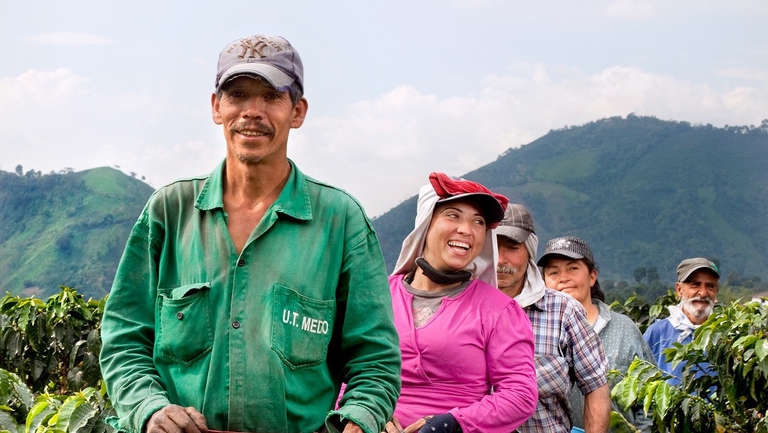Mountain areas are home to around 1 billion people and provide goods and services. This is why the protection of healthy mountain ecosystems has become a must. The op-ed by FAO’s Mountain Partnership Secretariat.
by Rosalaura Romeo,
Programme Officer at the Mountain Partnership Secretariat, hosted by the Food and Agriculture Organization of the United Nations (FAO)
Alberto works for the NGO Fundación CoMunidad in Panama where he manages a project that promotes shade grown coffee produced in the central mountain range of Panama under the Mountain Partnership Products Initiative. The Ceibal Coffee has received the Mountain Product label that, by certifying its mountain origin, quality and value has opened access to niche markets for small scale producers. Alberto is one of the 400 students from all over the world that every year since 2007 have come to northern Italy to attend the summer course “International programme on research and training on sustainable management of mountain areas (IPROMO)”, organized by the Mountain Partnership Secretariat of the Food and Agriculture Organization of the United Nations (FAO) with the University of Turin and the University of Tuscia.
![Coffee farmers]()
Bioeconomy in mountain areas, an opportunity for local development
In its eleventh year now, IPROMO provides capacity development to professionals and researchers from countries belonging to the Mountain Partnership on mountain-specific issues such as environmental conservation, water supply, income generation and food security. In the two charming alpine venues of Ormea in northwest Italy, and Pieve Tesino in northeast Italy, students learn the scientific foundations of sustainable mountain development through lectures by international experts and academic staff, seminars and group work. This year, 30 participants from 19 countries will focus on how bioeconomy can promote local mountain development by applying the principles of circular economy, waste recycling and green industrial policies. The mountain settings of the two-week summer course offer participants the opportunity to gain first-hand experience from local farmers and entrepreneurs of successful management systems and participatory approaches whereby local communities and authorities cooperate closely in the management of the mountain resources.
Mountain communities have learned to cope with the low productivity, marginality and fragility of their lands by implementing optimized energy systems, processing fluxes and managing natural resources. The principles of bioeconomy are very relevant to these strategies: producing renewable biological resources and converting these resources and waste into value-added products, such as food, feed, bio-based products and bioenergy. As mountains all over the world are threatened by climate change, natural disasters and unsustainable practices, and as impoverished mountain communities are trapped into vulnerable existences or forced to abandon their homes and lands, bioeconomy can offer solutions to reverse these trends.
The protection of healthy mountain ecosystems
With around 1 billion people living in mountain areas, specific pro-mountain solutions can contribute significantly to progress towards the implementation of the 2030 Agenda for sustainable development of the United Nations and its Sustainable Development Goals (SDGs). The protection of healthy mountain ecosystems is one specific target of the SDGs (15.4), as their role in the provision of goods and services is considered essential to sustainable development. Sustainable business practices, such as the one promoted by Alberto and Fundación CoMunidad with the support of the Mountain Partnership, are at the core of SDG 12 on ensuring sustainable production and consumption.
Investing in capacity development for mountains is fully in line with the 2030 Agenda. IPROMO is benefitting both the individual participants and their organizations, as shown by an assessment of the course conducted by the Mountain Partnership Secretariat in 2016. But it may also have a greater and longer-lasting impact as the community of knowledge and practice of IPROMO alumni – officers, researchers and technicians from governments and organizations – grows and develops joint activities.
By joining forces, this generation of professionals, from different peaks and representing different interests, can help protect mountain ecosystems and offer mountain people the opportunity of a decent life at high altitude while enjoying the same rights and opportunities as the rest of humanity.
The op-ed was initially published by IISD on 21 June
Siamo anche su WhatsApp.
Segui il canale ufficiale LifeGate per restare aggiornata, aggiornato sulle ultime notizie e sulle nostre attività.

Quest'opera è distribuita con Licenza Creative Commons Attribuzione - Non commerciale - Non opere derivate 4.0 Internazionale.










